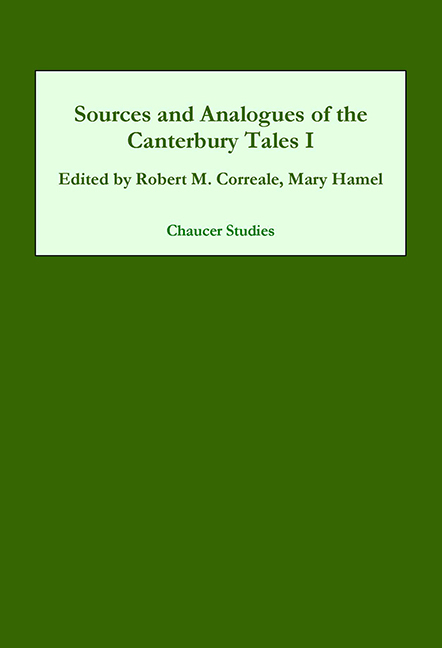Book contents
- Frontmatter
- Contents
- preface
- Acknowledgements
- The Frame
- The Reeve's Tale
- The Cook's Tale
- The Friar's Tale
- The Clerk's Tale
- The Squire's Tale
- The Franklin's Tale
- The Pardoner's Prologue and Tale
- The Tale of Melibee
- The Monk's Tale
- The Nun's Priest's Tale
- The Second Nun's Prologue and Tale
- The Parson's Tale
- Contributors and editors
- General Index
- Index of Manuscripts
The Monk's Tale
Published online by Cambridge University Press: 25 October 2017
- Frontmatter
- Contents
- preface
- Acknowledgements
- The Frame
- The Reeve's Tale
- The Cook's Tale
- The Friar's Tale
- The Clerk's Tale
- The Squire's Tale
- The Franklin's Tale
- The Pardoner's Prologue and Tale
- The Tale of Melibee
- The Monk's Tale
- The Nun's Priest's Tale
- The Second Nun's Prologue and Tale
- The Parson's Tale
- Contributors and editors
- General Index
- Index of Manuscripts
Summary
The Monk's Tale is a collection of seventeen stories describing the fall of great men or women (or in one case, an angel) from good fortune into permanent misery. The individual narratives vary in length from a single stanza of eight lines to sixteen stanzas for the longest story (Zenobia). In the Prologue of the Tale, the Monk calls such stories tragedies, a term that is elaborated upon in the first stanza of the Tale and again in the last. Tragedy is a type of narrative describing the fall of those in high rank through trust in Fortune (derived from the Roman goddess Fortuna), who is capricious and inevitably withdraws her gifts. The stories are told as a warning to others not to trust in the “blynd prosperitee” offered by Fortune (VII 1997). The theory of tragedy embodied in the Tale, particularly its connection with Fortune and its emphasis on moral instruction, seems to reflect late medieval definitions of tragedy as a narrative form. The philosophical conception of Fortune that lies behind this theory of tragedy, together with the association of Fortune with the fall of the great, was well known in the Middle Ages, authoritatively expressed in the De consolatione philosophiae of Boethius, a work Chaucer translated.
The general conception of a collection of tales on the downfall of the great Chaucer seems to have been taken from the De casibus virorum illustrium (“On the Falls of Illustrious Men”) of Giovanni Boccaccio. This indebtedness appears to be indirectly acknowledged in several of the manuscripts, which include the title De casibus virorum at either the beginning or the end of the Tale. The epigraph to the Tale in the Riverside Chaucer is: “Heere bigynneth the Monkes Tale De Casibus Virorum Illustrium.” On the basis of the manuscript evidence, it is likely, but not certain, that Chaucer himself was responsible for this apparent confirmation of an obligation to Boccaccio. Within the Prologue and the Tale themselves, however, Chaucer never names Boccaccio, and at line 2325, the Monk-narrator inexplicably suggests that Petrarch was his source, even though the story of Zenobia that is being told closely follows Boccaccio in certain of its details.
- Type
- Chapter
- Information
- Sources and Analogues of the Canterbury Tales: vol. I , pp. 409 - 448Publisher: Boydell & BrewerPrint publication year: 2002



